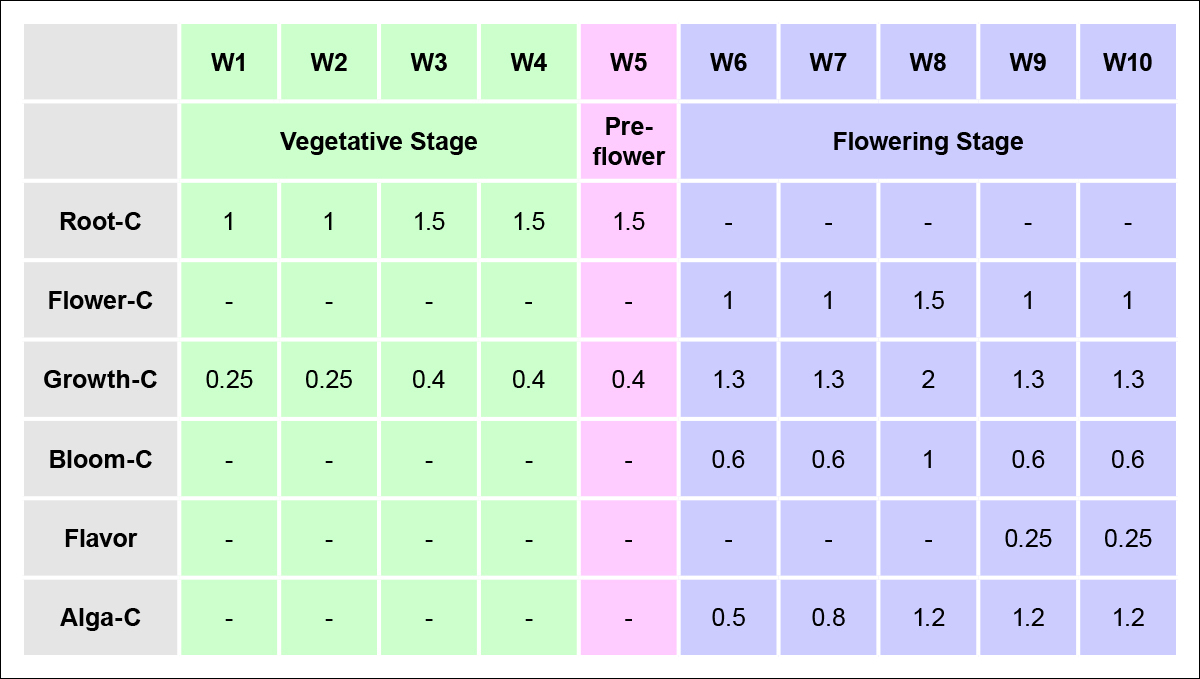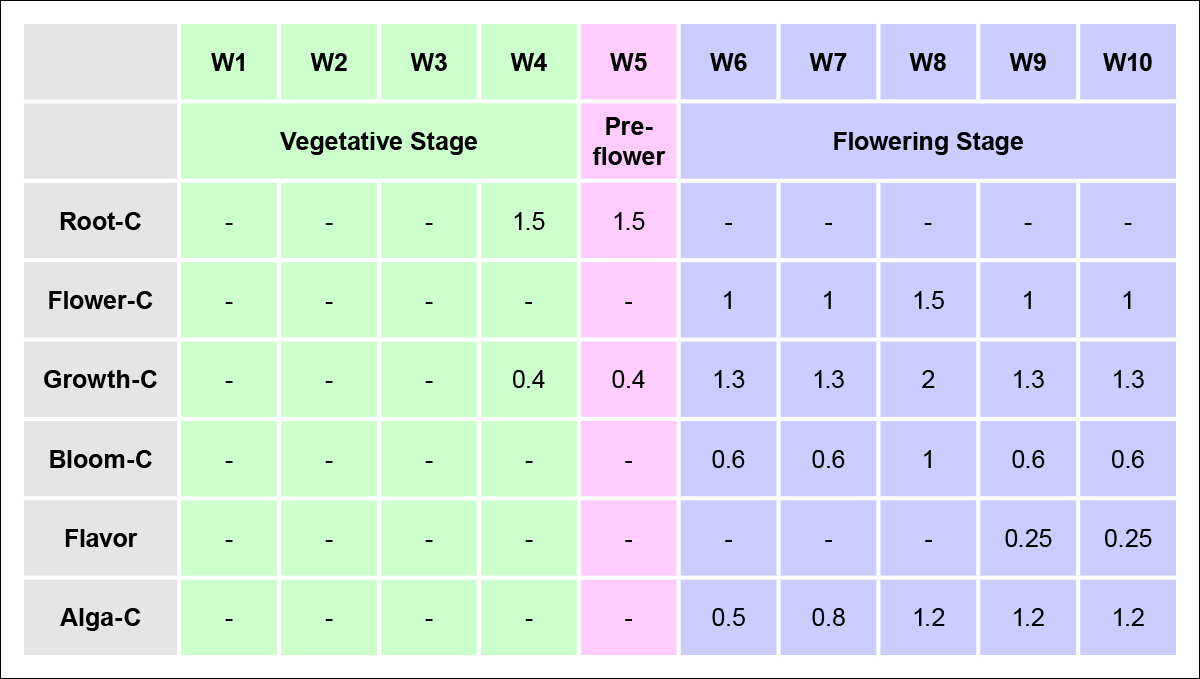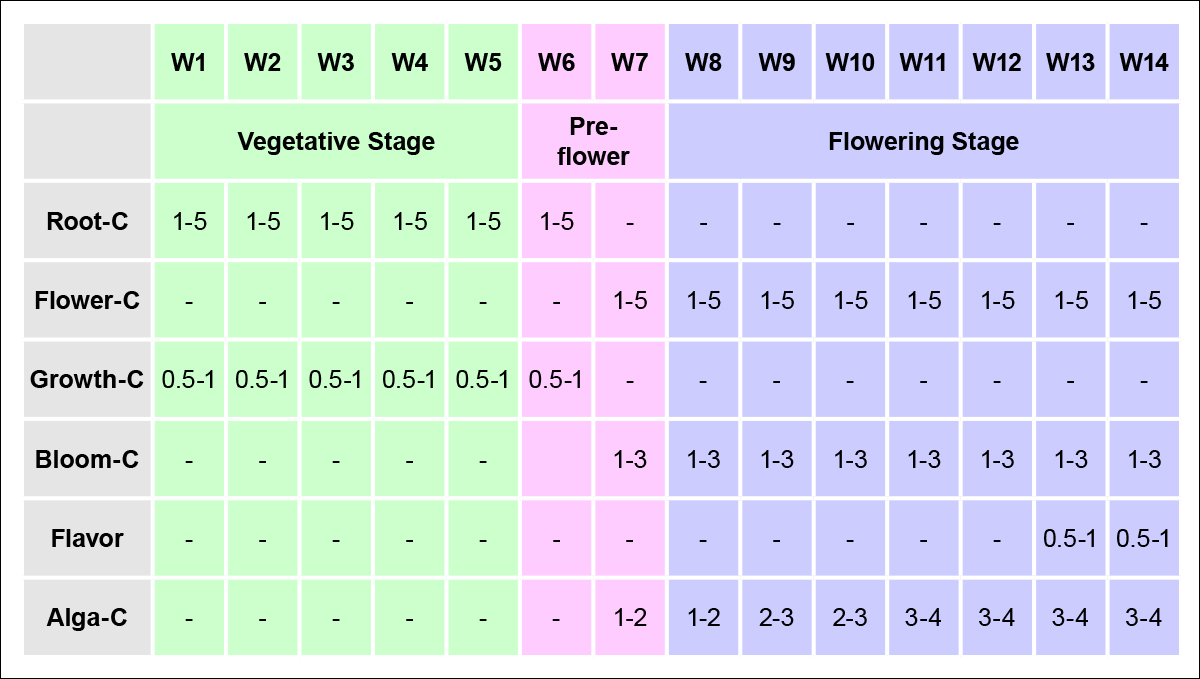Atami Feeding Chart | Usage Guide

- 1. Organo-mineral products
- 1. a. Basic nutrients
- 1. b. Stimulators
- 1. c. Additives
- 1. d. Atami feeding schedule for autoflowers in inert substrates (ml/l)
- 2. Pre-fertilized substrates
- 2. a. Atami feeding schedule for autoflowers in pre-fertilized substrates (ml/l)
- 3. Atami feeding schedule for photoperiodics
- 4. In conclusion
Atami first started in 1977 as a small project but quickly turned into a huge renowned brand with top-quality research labs and equipment, focusing on developing the best substrates and plant nutrition products. The brand offers several nutrient lines designed for all types of growers and grow setups while making it easy to used and cost-effective so, if you’re planning on trying Atami products in your next grow cycle, read along to learn a bit more about them and for the best feeding schedule for auto cannabis seeds!
The Atami nutrient range is broken down into a few main subcategories:
- ATA - Designed for cultivators who want a quick, easy, and simple nutrient schedule to follow that will produce excellent end results while being extremely budget-friendly.
- ATA NRG - These products are for the eco-conscious among us. The results produced are still of the highest quality, but the line is more expensive than the other 2 options.
- B’cuzz - This product line is designed for experienced cultivators who want to produce maximum yields and return from their crops. Slightly more expensive than the ATA liner, but still reasonable with results that do not disappoint.
All of these product lines can be used in conjunction with each other or interchangeably.
1. Organo-mineral Products
Atami offers an organic feeding line named ATA NRG, these products provide an eco-friendly alternative to growers who are looking to maintain the best taste and smell while being environmentally friendly.
Basic Nutrients
Among the mainly organic fertilizers, there are three types of products: Base nutrients, stimulators, and Additives; Each one of them will provide different things your plants need in different amounts, this way you provide a complete nutrient solution for your plant to grow strong.
Growth-C
Growth-C is a product designed to optimize the vegetative stage, resulting in a strong plant. This liquid organo-mineral fertilizer contains everything your plants need for solid plant growth, ensuring a sturdy main stem and side branches.

Remember that the basic nutrients are not extra, you should always provide at least the basic NPK and micronutrients for your plants to be able to grow healthy and develop as they should so make sure your plants get at least Nitrogen, Phosphorus, Potassium, Calcium, and Magnesium!
| Nitrogen (N) | Phosphorus (P) | Potassium (K) |
|---|---|---|
| 2 | 3 | 5 |
How and When to Apply
As this is an additive and not a base fertilizer it can be used as often or as infrequently as you choose. Although Atami does say on their website that it can be used during the entire lifecycle, we prefer to limit the use of GROWTH-C to just the vegetative growth stage and the 2 weeks of pre-fower. It can be applied directly into the nutrient feed solution, or as a foliar spray. Dosage requirements are 3 – 5 ml per liter of water as a nutrient feeding solution, or 1 – 3 ml per liter of water when used in foliar spray form.
Bloom-C
Bloom-C is also a liquid organo-mineral fertilizer developed for the flowering stage of all types of plants, including cannabis. Have in mind that organo-mineral means that this product contains both organic and synthetic ingredients in its composition.
| Nitrogen (N) | Phosphorus (P) | Potassium (K) |
|---|---|---|
| 0 | 17 | 13 |
This product provides an increased amount of phosphorus and potassium while also providing algae and seaweed extract, amino acids, micronutrients, vitamins, enzymes, and plant hormones which result in denser and bigger flowers.
How and When to Apply
This additive can be applied as soon as you start to see the first signs of flower formation. This can be used with any growing substrate or medium, with the exception of irrigation systems. Again, this is an additive and not a base nutrient, so it can be used as often or as sparingly as you see fit. This should only be used as a feeding solution and can be added to the regular nutrient solution you use to feed your crop at a rate of 1 – 3 ml per litre of water.
Stimulators
Also from the ATA NRG product line, Atami offers plant stimulators that give your crop that extra food they need during crucial moments such as the beginning and end of the grow cycle, helping you deal with any nutrient deficiencies that may appear.
Root-C
Root-C contributes to a healthy and well-developed root system, ensuring a faster and more vigorous root growth, with increased resistance against mold and bugs, and thanks to the unique blend, you can expect a more branched out root system that can reach further deep down, absorbing more water and nutrients when needed. An increased root system doesn’t just lead to improved plant health, development, and productivity by changing the structure of the subterranean organs. By increasing the size and function of this network, Root-C increases the capacity for specimens to interact with soil food web organisms. Think about it like this: Plants are essentially carbon sinks.
During the process of photosynthesis, these lifeforms capture carbon from the atmosphere, by harnessing sunlight, in order to create carbon-based molecules that serve as an energy source. Plants pump a large amount of these molecules down into their roots and out into the soil. Why? So that they can farm—you heard that right—a range of microorganisms. This strategy allows them to pair up with different forms of fungi that trade relatively scarce micronutrients for valuable sugars. Likewise, these root exudates attract forms of bacteria that plant roots are able to eat whole. The bottom line is, the healthier the root system, the more opportunity a plant has to manipulate life in the root zone, resulting in healthier plants and larger yields during the late flowering stage of the growing cycle.
- Healthier root system;
- Improved nutrient uptake;
- Prevents soil diseases.
Flower-C
Flower-C, just like the product mentioned before, is a stimulator but it’s designed for the flowering stage. Thanks to the unique recipe, when combined with Bloom-C it will result in faster flower development, as well as bigger buds with an improved taste and smell.

This happens because bigger buds result in more area for the trichomes to grow and it's in the trichomes where the terpenes are produced and stored so your plants will get better overall quality if you use it properly and if the drying and curing process goes well.
- Improved taste and smell;
- Faster flower development;
- Easily absorbable.
Additives
Now, additives are not obligatory so you can grow your plants without using them but these products provide that extra push your plants may need, taking the flower quality and quantity to the next level so they’re highly recommended.
Alga-C
Alga-C is a mineral-organic additive mainly composed of seaweeds; This liquid product provides lots and lots of amino acids, micronutrients, vitamins, and natural plant hormones which help prevent stress, ensuring your plant gets everything it needs to thrive while also improving soil condition.

These elements are highly recommended due to minimizing stress such as heat stress, light stress, overwatering, overfeeding and pH-related problems. As well as providing a wealth of the nutrients that plants require in order to fulfil key physiological functions, seaweed works as a biostimulant that drives plant growth, helping to unlock peak performance and the maximum yields that come along with it. A mix of plant growth-promoting substances, such as auxins and cytokinins, make all the difference when it comes to good harvests and great harvests.
- Better nutrient absorption;
- Prevents stress;
- Can be used as a foliar spray.
Flavor
Flavor is an additive designed for the flowering stage, this product is mainly composed of beet molasses and potassium, thus stimulating bud production. Thanks to the unique blend, this additive contributes to optimal sap flow, also resulting in sturdier branches while improving bud taste and smell.
| Nitrogen (N) | Phosphorus (P) | Potassium (K) |
|---|---|---|
| 0 | 0 | 7 |
Now that you know a bit more about the mineral-organic fertilizer line, here’s what you’ve been waiting for, the feeding schedule for autoflower!
Atami Feeding Schedule For Autoflowers in Inert Substrates (ml/L)
Just remember that this feeding chart is designed for inert substrates, if you’re planning on growing with any of the pre-fertilized substrates mentioned below, make sure you use the next feeding chart.

Have in mind that the manufacturer recommends using water with a pH of 6.0-6.5 and the EC around 1.2-2.2 so make sure your water is proper or that you adjust the nutrient doses to compensate for the "harder" or "softer" water.
2. Pre-Fertilized Substrates
If you wanna save a bit of time and effort, you can also start your plants in Atami’s substrates. These products provide a base for you to grow your plants in different ways while ensuring the quality of the substrate and the nutrients in it.
Janeco Light-mix (EC 1.0-1.25)
With an EC of 1.0-1.25, Janeco Light-mix is an ideal substrate for those looking for a smooth start of the grow cycle, allowing you to avoid overfeeding when growing more sensitive plants such as autoflowers. This substrate not only comes lightly fertilized but also contains perlite which makes the substrate more oxygenated and with better water retention.
Cocos Substrate (EC 0-8-1.0)
With an EC of 0.8-1.0, Cocos Substrate is fairly less nutrient-rich than Janeco Light-mix so you will have to start feeding your plant earlier, which is not bad by any means because it allows you to control even more what your plants absorb.

This substrate has the perfect structure for a well-oxygenated medium that also retains water as it should, resulting in faster root development. Just remember that if your growing conditions are too humid you should mix more perlite to avoid overwatering.
Bi-Growmix (EC 1.0-1.25)
Bi-Growmix is an organic pre-fertilized soil with an optimally structure and free of harmful microorganisms, making it a good start for a successful grow cycle. This medium-fertilized substrate contains everything your plants need for the first 3-4 weeks, with 20% coco fiber and chips that provide ideal oxygenation for the roots to thrive.
Atami Feeding Schedule For Autoflowers in Pre-Fertilized Substrates (ml/L)
Now, if you want to avoid overfeeding and work a little bit less, you can start your autoflowers with any of the substrates mentioned above, this way you don’t need to feed for the first 2-3 weeks.

Have in mind that depending on the substrate you’re using, you will have to increase or decrease the nutrient solution depending on the EC and how your plants react. Also, remember that the manufacturer recommends using water with a pH of 6.0-6.5 and the EC around 1.2-2.2.
3. Atami Feeding Schedule For Photoperiodics
Now, if you prefer growing photoperiodics or are planning on growing photoperiodics in your next grow cycle, here’s a feeding schedule for you.

This feeding schedule can be used for soil and coco but if you are growing in hydro or just want to experiment with other fertilizers, make sure you take a look at other nutrient lines from Atami.
4. In Conclusion
Atami offers more than 5 different nutrient lines designed for different types of growers and grow setups, thanks to being easy to use and cost-effective, you can grow top-quality cannabis and any other type of plants without struggling so make sure you take a look at all of their nutrients before starting! The Atami nutrient range is broken down into a few main subcategories:
- ATA - Designed for cultivators who want a quick, easy, and simple nutrient schedule to follow that will produce excellent end results while being extremely budget-friendly.
- ATA NRG - These products are for the eco-conscious among us. The results produced are still of the highest quality, but the line is more expensive than the other 2 options.
- B’cuzz - This product line is designed for experienced cultivators who want to produce maximum yields and return from their crops. Slightly more expensive than the ATA liner, but still reasonable with results that do not disappoint.
Remember that all of these product lines can be used in conjunction with each other or interchangeably. If you’ve used Atami nutrients before feel free to help fellow autoflower growers, leave your tips and tricks in the comment section below!











Comments